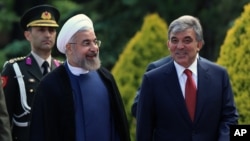ANKARA, TURKEY —
Iranian President Hassan Rouhani has begun a two-day visit to Turkey that will focus on developing bilateral trade and regional cooperation.
Rouhani’s visit is the first Iranian state visit to Turkey in 18 years.
Turkish President Abdullah Gul, speaking at a joint news conference, described the visit of his Iranian counterpart as historic, and said he and Rouhani had committed themselves to improving relations, which have been strained over developments in Syria.
Gul said the visit furthers their countries' bilateral relations and that he and Rouhani had expressed their "common will" during the meeting.
Gul said they had agreed on several cultural and economic deals.
Rouhani described Turkey as one of the most important countries in the region and said improving relations with neighbors was a priority of his presidency.
Rouhani said he and Gul discussed Syria and Egypt, and how Iranian-Turkish cooperation could help stop the bloodshed in the region, according to the French news agency AFP.
"What's important to us is for the two countries to reach stability and security, that the people's vote are determining, and an end to the war, bloodshed and killings between brothers," he said according to AFP.
Strained over Syria
Turkish-Iranian relations have been strained over Syria, with the two countries strongly supporting opposite sides in the conflict.
In addition, Ankara has strained ties with Iraqi Prime Minister Nouri al-Maliki, an ally of Tehran.
But improving trade is predicted to be a focus of Rouhani’s visit - specifically, working toward achieving the goal of doubling bilateral trade to $30 billion by 2015.
That goal was set during Turkish Prime Minister Recep Tayyip Erdogan's visit to Tehran in January.
Iran is a major supplier of natural gas to Turkey, but, according to Turkish Energy Minister Taner Yildiz, a pricing dispute is holding back expansion of trade.
A senior Turkish official told Reuters news agency that Ankara will repeat its demand for a discount on the price of natural gas from Iran, which Ankara says is too expensive compared with other suppliers like Russia and Azerbaijan.
Iran has so far dismissed Turkish demands it drop the price of gas under the current agreement, according to Reuters.
Gul and Rouhani are also expected to discuss Iran’s controversial nuclear energy program and its ongoing talks with the international community.
Turkey has defended Iran's right to develop a peaceful nuclear technology program, but it adamantly opposes any development of nuclear weapons, fearing it would lead to an arms race in the Middle East.
"We don't want any country in our region to possess nuclear weapons. We maintain our desire for a Middle East cleared of weapons of mass destruction," Gul said in an AFP report.
Ankara sees the success of the nuclear program talks and an end to international sanctions against Iran as key to expanding trade with Tehran.
Some information for this report provided by Reuters and AFP.
Rouhani’s visit is the first Iranian state visit to Turkey in 18 years.
Turkish President Abdullah Gul, speaking at a joint news conference, described the visit of his Iranian counterpart as historic, and said he and Rouhani had committed themselves to improving relations, which have been strained over developments in Syria.
Gul said the visit furthers their countries' bilateral relations and that he and Rouhani had expressed their "common will" during the meeting.
Gul said they had agreed on several cultural and economic deals.
Rouhani described Turkey as one of the most important countries in the region and said improving relations with neighbors was a priority of his presidency.
Rouhani said he and Gul discussed Syria and Egypt, and how Iranian-Turkish cooperation could help stop the bloodshed in the region, according to the French news agency AFP.
"What's important to us is for the two countries to reach stability and security, that the people's vote are determining, and an end to the war, bloodshed and killings between brothers," he said according to AFP.
Strained over Syria
Turkish-Iranian relations have been strained over Syria, with the two countries strongly supporting opposite sides in the conflict.
In addition, Ankara has strained ties with Iraqi Prime Minister Nouri al-Maliki, an ally of Tehran.
But improving trade is predicted to be a focus of Rouhani’s visit - specifically, working toward achieving the goal of doubling bilateral trade to $30 billion by 2015.
That goal was set during Turkish Prime Minister Recep Tayyip Erdogan's visit to Tehran in January.
Iran is a major supplier of natural gas to Turkey, but, according to Turkish Energy Minister Taner Yildiz, a pricing dispute is holding back expansion of trade.
A senior Turkish official told Reuters news agency that Ankara will repeat its demand for a discount on the price of natural gas from Iran, which Ankara says is too expensive compared with other suppliers like Russia and Azerbaijan.
Iran has so far dismissed Turkish demands it drop the price of gas under the current agreement, according to Reuters.
Gul and Rouhani are also expected to discuss Iran’s controversial nuclear energy program and its ongoing talks with the international community.
Turkey has defended Iran's right to develop a peaceful nuclear technology program, but it adamantly opposes any development of nuclear weapons, fearing it would lead to an arms race in the Middle East.
"We don't want any country in our region to possess nuclear weapons. We maintain our desire for a Middle East cleared of weapons of mass destruction," Gul said in an AFP report.
Ankara sees the success of the nuclear program talks and an end to international sanctions against Iran as key to expanding trade with Tehran.
Some information for this report provided by Reuters and AFP.




